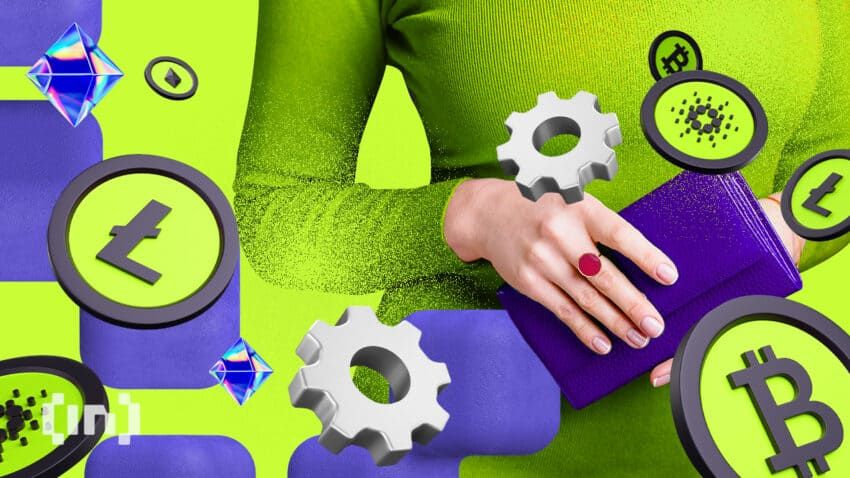Crypto investors must use a secure, user-friendly wallet to manage their digital asset investments. Two of the most popular web3 wallets are MetaMask and Coinbase Wallet. This MetaMask vs. Coinbase Wallet comparison offers a comprehensive analysis of both, focusing on their features, security, and ease of use. We aim to provide clarity and valuable insight, ensuring you can select the wallet that best suits your needs.
KEY TAKEAWAYS
➤ Coinbase Wallet supports a wider array of cryptocurrencies and blockchains, while MetaMask focuses primarily on Ethereum and EVM-compatible chains.
➤ Both wallets are designed to be user-friendly, but Coinbase Wallet is particularly noted for its interface that is more accessible to beginners.
➤ Both wallets are non-custodial, providing users with control over their private keys and funds, though being hot wallets, they remain vulnerable to online threats.
➤ MetaMask excels in integration with Ethereum and DApps, whereas Coinbase Wallet offers deeper integration with its own exchange and supports more diverse financial activities.
What is Coinbase Wallet?

The Coinbase Wallet is a non-custodial wallet that’s the product of Coinbase Global Inc. From its self-custody nature, it allows you complete control of your funds. It also acts as a gateway to DApp and supports various digital assets. The wallet also integrates with the Coinbase exchange.
Features
Like its competitor, the Coinbase Wallet is self-custodial. So, it gives you charge of your private keys and crypto assets. Additionally, it connects directly to the Coinbase exchange, streamlining cryptocurrency transactions.
The wallet offers a wide variety of crypto assets. These include the majors like Bitcoin and Ether, alongside popular DeFi tokens and NFTs. It is, therefore, a more versatile option for crypto enthusiasts.
Again, it directly supports DApps, thus facilitating users’ participation in the DeFi and NFT markets. It also provides for cross-platform access. You can use it as a browser extension or a mobile app on Android and iOS devices. Thus, it lets you access your crypto holdings anytime, anywhere.
Pros and cons of Coinbase Wallet
The Coinbase Wallet has many positive features. But it also has its negative one. Here’s a sample of both.
| Pros | Cons |
|---|---|
| User-friendly interface | Hot wallet |
| NFT support | The wallet is closed-source |
| DApp integration | DApp limitation |
| Diverse tokens | |
| Fiat integration | |
| Hardware wallet compatibility |
What is MetaMask?

MetaMask is a leading Ethereum-centric cryptocurrency wallet. The software is a product of ConsenSys Software Inc. and comes as either a browser extension or a mobile app. Its intuitive and user-friendly design enables users to access the web3, DeFi, and NFT ecosystems quickly.
Features
For starters, MetaMask is a non-custodial wallet. As such, it provides users with total control over their funds. The wallet also supports multiple networks because you can configure it to connect to many EVM-based blockchain platforms.
Further, the wallet has a built-in decentralized crypto exchange, thus supporting token swapping. This feature is a plus for users looking for the convenience of an interoperable wallet.
The wallet is also web3-ready. It seamlessly connects to DApps running on the Ethereum network. This connection makes MetaMask a go-to wallet for many investors searching for web3 experiences like DeFi and NFTs.
Pros and cons of MetaMask
As is the case with every cryptocurrency wallet, MetaMask has its advantages and disadvantages. Here’s a sneak peek of both.
| Pros | Cons |
|---|---|
| Self-custodial | Hot wallet |
| Seamless Ethereum integration | High gas fees |
| NFT support | Mobile app lacks features |
| DApp integration | |
| Enhanced security and privacy | |
| User-friendly interface and flexibility | |
| Hardware wallet compatibility |
MetaMask vs Coinbase Wallet: Ultimate comparison
In this section, we deeply dive into the two wallets, comparing the most significant features, including their ease of use, security, and more.
| Feature | MetaMask | Coinbase Wallet |
| Primary focus | Multi-chain support, focused on EVM-compatible chains | Supports a broader variety of chains, including Bitcoin, Dogecoin, and Litecoin |
| User interface | Straightforward, suitable for both beginners and advanced users | More intuitive and beginner-friendly with educational resources |
| Accessibility | Browser extension and mobile app | Browser extension and mobile app |
| Wallet type | Hot wallet | Hot wallet |
| Source code | Open-sourced | Closed-sourced |
| Staking options | Accessed ETH staking directly through the wallet | Direct and user-friendly staking options within the wallet |
| Supported cryptocurrencies | Focused on assets on Ethereum and EVM-compatible chains | Supports a wide range of cryptocurrencies and NFTs |
| Security and control | Non-custodial | Non-custodial |
| Decentralization | High, due to open-source nature and self-custodial feature | High, self-custodial, but limited by closed-source code |
| Standout features | Deep integration with Ethereum, inbuilt coin-swapping mechanism | Seamless integration with Coinbase Exchange, supports many blockchains |
| Mobile apps | Available for Android and iOS | Available for Android and iOS |
| Customer support | Multi-chain support focused on EVM-compatible chains | FAQs, dedicated customer lines, chat options, email support, and social media presence |
| Staking | Indirect through DeFi platforms | Direct staking options for various cryptocurrencies |
| Hardware wallet integration | Supports linking with hardware wallets | Supports linking with Ledger hardware wallets |
| NFT support | Yes | Yes |
| Token swaps | Yes | Yes |
Beginner friendliness
An intuitive user interface is one of the features to look for when choosing a cryptocurrency wallet. MetaMask and Coinbase Wallet are straightforward, making them excellent choices for beginners and advanced users.
Setting up your MetaMask or Coinbase Wallet is quite simple. None of the wallets require KYC checks, so you can use your wallet immediately to buy and sell cryptocurrencies. Although both wallets have easy-to-use interfaces, the Coinbase Wallet offers a more seamless user experience for beginners, as it includes intuitive navigation features.
Since both MetaMask and Coinbase Wallet are hot wallets, you can access your funds anytime and anywhere as long as you have an internet connection.
Purpose and functionality

Both wallets are similar because their primary purpose is securing custody and managing diverse crypto assets.
That said, they cater to different needs and have contrasting functionalities. The difference between MetaMask and Coinbase Wallet is that the primary focus is the Ethereum ecosystem and EVM-compatible chains. At the same time, the latter supports a wider range of blockchains, including Bitcoin.
Supported cryptocurrencies
The MetaMask wallet was built with an Ethereum focus. As such, the wallet supports ETH, ERC-20 tokens, and EVM chain tokens. You can easily add any of the supported chains to the wallet to send or receive any of the layer-1 tokens and those built on top of them.
Coinbase, on the other hand, supports a broader variety of tokens. Besides all the coins and tokens MetaMask supports, you can also use Coinbase with other networks, including Bitcoin, Dogecoin, Solana, and Litecoin. The wallet also supports all other assets built on those blockchain networks, including NFTs.
When comparing MetaMask vs. Coinbase in terms of supported cryptocurrencies, Coinbase takes the lead and is an excellent option for anyone looking to invest in more than just digital assets on Ethereum and EVM-compatible chains.
Security and control

Coinbase Wallet and MetaMask are non-custodial wallets, and users have control over their keys. This is a vital feature as it means that users can control their crypto assets without relying on any third party. A common phrase among crypto investors is, ‘Not Your Keys, Not Your Coins.’
Both platforms offer seed phrases for wallet backup and recovery should you lose access to your wallet. You can use the seed phrase to regain access to your funds. Coinbase further offers an optional cloud backup while using the mobile app.
However, it’s worth noting that MetaMask and Coinbase Wallet are both hot wallets, which means they are always connected to the internet. This feature, while convenient, makes the wallets vulnerable to hackers and phishing scams.
Decentralization
Decentralization is a crucial element of the crypto world, and both wallets have upheld this critical feature. Thanks to their self-custodial nature, they present themselves as the gateways to the decentralized web. This approach empowers users to take charge of their financial lives through blockchain-based apps.
The two wallets, however, differ in the nature of their source codes. MetaMask is open-sourced and, therefore, allows independent audits of its software. On the contrary, the Coinbase Wallet is closed-sourced, and users cannot inspect its code.
Standout features
Among MetaMask’s standout features is that it is non-custodial, so you have control of your private keys. That, in turn, gives you total control over your funds. It is also open source, which allows the public to audit its code, enhancing its transparency and security.
Furthermore, MetaMask integrates deeply with Ethereum and the broader EVM-powered Web3 ecosystem. That enables its users to enjoy a seamless experience with decentralized applications (DApps) and NFTs, while its inbuilt token-swapping mechanism simplifies DeFi token exchange without needing to connect to a decentralized exchange.
On the other hand, the Coinbase Wallet blends seamlessly with the Coinbase Exchange. As such, users can trade crypto directly from their wallets. It also supports many cryptocurrencies, giving users unmatched trading options.
Both wallets have a native DApp browser, allowing users to access these tools directly.
Mobile apps
Both wallets have mobile apps that users can download for their Android and iOS devices. These are readily available from the respective stores and very easy to install.
MetaMask started as a browser extension and later introduced a mobile app for users. On the other hand, Coinbase first introduced the mobile app before adding a browser extension to its desktop app as another of the platform’s features.
Customer support
Customer care is a critical component of any crypto app, and both wallets have upheld this. Users of both platforms can tap into their extensive FAQs and self-help materials. They also have dedicated customer lines where you can call for help to resolve any issues.
Both MetaMask and Coinbase have provided chat options and email support, which you can use if you can’t reach a customer executive on the phone. Moreover, both have an active social media presence on X, where users can engage them.
MetaMask vs Coinbase Wallet: Other features
This crypto wallet comparison wouldn’t be complete without considering their extra features.
Staking
There are many other ways to interact with the crypto world besides buying and selling cryptocurrencies. Staking is one of the popular ways of earning investment income in crypto.
You can use any of the two crypto wallets to lock up your crypto for certain periods to receive staking rewards. However, Coinbase Wallet’s staking feature is arguably more beginner-friendly.
Gas fees
When you initiate a cryptocurrency transaction, your fee is typically determined by the transaction size measured in bytes. It’s commonly referred to as a gas fee. The faster your transactions, the higher the gas fee.
Gas fees are determined by the underlying blockchain. You can however use a wallet to increase the transaction fee for quicker confirmations.
NFT support
Both wallets offer NFT support. You can collect, trade, and even share your digital collectibles with them. However, it is worth noting that with MetaMask, you can only trade NFTs using the mobile app and not the browser extension.
Hardware wallet integration
While both platforms allow you to connect your preferred hardware wallet, MetaMask is more versatile. Besides Ledger and Trezor, you can integrate Keystone, Lattice, and AirGap Vault devices. On the contrary, Coinbase Wallet only supports Ledger.
Token swaps
Token swaps are a staple in the decentralized finance world, and both wallets support this function. But that’s as far as their similarities go. Whereas the Coinbase Wallet only charges gas fees for the swaps, MetaMask charges an additional 0.875% fee.
Can you connect Coinbase to MetaMask?
Coinbase has two different wallets: the Coinbase wallet is a standalone non-custodial wallet, separate from the Coinbase Exchange wallet that’s custodial.
You can connect the Coinbase Wallet to MetaMask as these are compatible. You’ll need to find your private keys and follow this straightforward process to import the latter to the former. But you cannot connect the Coinbase Exchange Wallet as you will need its private keys, which you don’t have access to.
Should I use MetaMask or Coinbase for NFTs?
The experience of buying NFTs on both wallets is fairly the same. But there’s a whole lot of differences when it comes to their offerings. MetaMasks supports buying NFTs on Ethereum and its layer-2 protocols only. So, it has a limited offering compared to Coinbase Wallet, which supports NFTs spanning many blockchains.
MetaMask vs. Coinbase: Which wallet stands out?
MetaMask, primarily an Ethereum wallet, is known for its seamless integration with DApps. On the other hand, Coinbase Wallet supports a wide range of cryptocurrencies and offers hot and cold storage options. The choice between the two depends on individual needs such as preferred cryptocurrencies, DApp usage, and desired level of security. Both offer excellent solutions for crypto storage. Overall, as a multi-purpose, multi-chain offering, Coinbase Wallet has an edge over MetaMask.
Frequently asked questions
Is MetaMask a good crypto wallet?
Is there a wallet better than MetaMask?
Can I use the same wallet for Coinbase and MetaMask?
Is Coinbase Wallet the best wallet?
Is MetaMask wallet better than Coinbase?
Which is the safest crypto wallet?
What are the disadvantages of Coinbase Wallet?
Is Coinbase Wallet safe for the long term?
Is there a monthly fee for the Coinbase Wallet?
Is the Coinbase Wallet hot or cold?
Is MetaMask hot or cold?
What is the benefit of a Coinbase Wallet?
Disclaimer
In line with the Trust Project guidelines, the educational content on this website is offered in good faith and for general information purposes only. BeInCrypto prioritizes providing high-quality information, taking the time to research and create informative content for readers. While partners may reward the company with commissions for placements in articles, these commissions do not influence the unbiased, honest, and helpful content creation process. Any action taken by the reader based on this information is strictly at their own risk. Please note that our Terms and Conditions, Privacy Policy, and Disclaimers have been updated.




